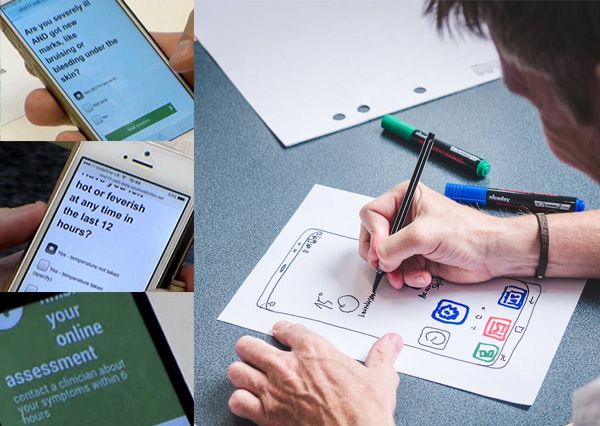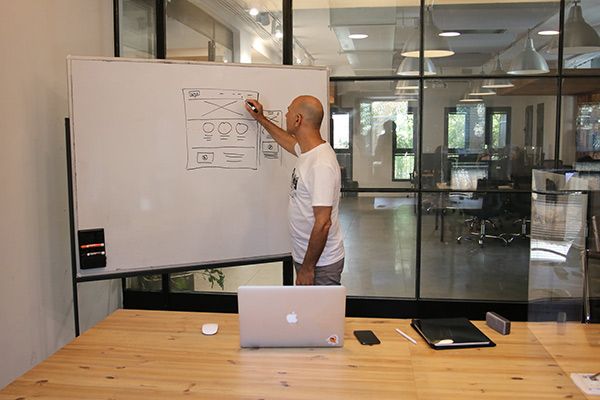
How investing in UCD benefits the healthcare sector
John Graham – Lead UX Consultant
The healthcare landscape is incredibly complex. Most people's only interactions are with patient facing staff; doctors, nurses and receptionists, but behind the scenes there is a lot more going on than most would assume.
Complexities aside, all the people, processes and systems have the same end goal; to provide care and support to patients, so why would the healthcare sector, in particular the NHS, spend money on UCD instead of investing it straight into more doctors, nurses, and front-line staff?
Is having a simple app or interviewing some patients to find out what frustrates them going to help when you’re struggling to get through to your GP to book an appointment at 8am, only to find they’ve all been booked by the time you finally get through at 8:03? Let’s dig in…
Because most people only interact with patient facing staff and don’t have a view of the complexities behind the scenes, it’s all too easy to make assumptions and get frustrated with the services they receive.
For example, let’s imagine a GP practice is closing, so all their patients need to find a new GP. There’s one just across the road, so a lot of the patients will pop over there to sign up. The new GP then needs to get the patients records from the closing GP to put onto their system. Seems simple enough – it’s just over the road after all. Unfortunately, it’s not so simple. All patients’ records are physically printed out, and then shipped to a big warehouse for storage, only to be then shipped from the warehouse to the new GP, still on paper, which office staff must then manually enter in on their GP system. If I didn’t know better, I’d have presumed the information would be sent digitally, directly to the new GP – but that isn’t the case. Practices have thousands of patients, so imagine the time it takes for the office staff to manually add patients’ information onto their system… I’ll let you do the math.
What if, by investing into UCD and engineering, that process could be digitised? That would mean all the time spent manually adding data onto the GP system could be used helping patients and be generally more productive.
Again… It’s complicated.
I’m sure the device you’re reading this on is one of 4 or 5 mainstream operating systems used worldwide, but in healthcare, there are multiple different providers, systems, and versions of those systems which for all intents and purposes speak different languages, so in digitising we’d first need to find out what systems are used, what “language” they speak in, and a whole load of other information; and that’s where UX research comes in. That research is crucial in finding out the detailed information required for software engineers to build the digital transfer system.
Let’s look at another example, how would having a simple and easy to use app add value to the users? First, lets think about who we mean as users. The patients who use the app are obvious, but there’s also the people who interact with the data the app sends, i.e. the back office staff at your GP who receive your repeat prescription request; they are a user too, so their needs, goals and frustrations need to be taken into account just as much as the patient users do.
Back to the question at hand – how does it add value? If the app isn’t easy to use, some users may get confused and not be able to complete what it is they are trying to do. If the user can’t complete their goal in the app – what would they do? Call the GP – adding to the call volume and front office work for the practice. By ensuring a simple, optimised journey within the app, and ensuring users can complete their goals, we can reduce the burden on the practice as the patients are more likely to be able to self-serve. That’s where UX design comes in. We’ll analyse the user journeys, understand their needs, and design a solution to meet them as simply and efficiently as possible.

The time solutions like these saves adds up and leads to significant cost savings. For example, if each call a practice receives costs it £1, and we can save 10 calls a day, that’s £50 saved a week. There are around 6,500 GP practices in England, so spread across them, that’s a £325,000 saving per week. Over a year, that’s £17 million.
So, how does investing in UCD benefit the healthcare sector? It improves how patients experience healthcare, it saves money – which allows those funds to be better utilised elsewhere, it saves time – allowing staff to focus on other tasks, it makes healthcare technologies easier to use and more effective, increases efficiency, and ultimately helps patients get better treatment, which in turn, saves more lives.